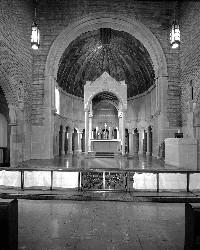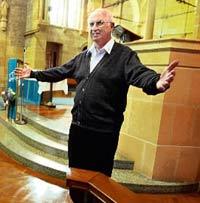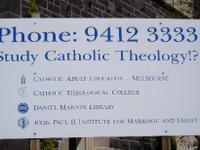"New Hope for the 'Old Mass'...or Not?"
*As always, read with discernment.Some signs point in one direction, some in another. Is there a Vatican document in preparation on the subject? Perhaps. The decision will have to be taken by Benedict XVI...
VATICAN CITY, Friday, October 28, 2005
Waiting... That's the mood in Rome this October.
Waiting for what?
For Pope Benedict XVI to take decisions.
Most Vatican watchers are waiting for personnel decisions in November regarding the Roman curia. Will Cardinal Angelo Sodano be replaced as Secretary of State? Who might replace him? These sort of questions.
Most are also now waiting for the text of the first papal encyclical. It has been widely reported in recent days that the text is finished, that it is being translated into various languages, that it will be released on December 8, and that it will be a reflection on the words in John's Gospel, "God is love."
And almost everyone is waiting for what a document on the criteria for admission into seminaries will say about homosexual tendencies as an impediment to priestly ordination.
But only a few, it seems, are interested in what Benedict will decide about the Roman liturgy -- the way the Church worships God.
Benedict has been saying for more than 20 years that there were grave oversights and omissions in the way the Second Vatican Council's liturgical reform was implemented. And he has written repeatedly that what is needed in the Church is a "reform of the reform" to remedy some of those oversights and omissions.
But there has been no indication, though Benedict has now been Pope for more than half a year (he was elected on April 19) of what course Benedict will chart in the matter of the Church's liturgy.
What seems clear from the Synod of Bishops, which met here from October 2 to 23 to discuss the Eucharist, is that the vast majority of bishops in the Church today do not share Benedict's reservations about the problematic nature of the conciliar liturgical reform.
The mood of the Synod bishops with regard to the liturgy was by and large "upbeat," with few bishops offering more than mild critiques of the liturgical revolution which swept the Church following the end of the Council (1965).
But in early October, an official very close to Pope Benedict, Msgr Camille Perl, Secretary of the Holy See's Ecclesia Dei Commission (the body entrusted with keeping contact with those Catholics who are devoted to the old Tridentine-rite liturgy, especially the group around Archbishop Lefebvre which went into schism in 1988) had some thought-provoking things to say that have gone entirely unreported up to now.
"Inside the Vatican" magazine, in keeping with the hopes and concerns expressed by Pope Benedict, has consistently followed the work of the Ecclesia Dei Commission with great attention.
Therefore, two of our writers were present at an October 8-9 conference in Rome sponsored by Una Voce ("With One Voice"), a group which has labored for 40 years to have the "old Mass" remain available throughout the Catholic Church for those faithful who would like to attend Mass celebrated in that rite.
On October 9, Msgr Perl addressed the gathering.
Perl first of all brought the greetings of Cardinal Castrillon-Hoyos, Prefect of the Congregation for the Clergy and President of the Ecclesia Dei Commission, adding, quite candidly, that Castrillon-Hoyos has done more to support the old liturgy than any of his predecessors.
Then Perl gave a sketch of Benedict's present mind regarding the liturgy.
"We have had a new Pope already 5 or 6 months," Perl said. "And I must say, there has been a change in the atmosphere. There is a new spotlight focusing on us." His point was clear: in the months since Benedict's election, the Ecclesia Dei Commission has come into far more prominence than during many previous years passed in the "Vatican shadows."
Perl related that, for the past two decades, while serving in his post at the Ecclesia Dei Commission, "I was ignored by very many people in Rome." But in recent months, he continued, "When I am on the streets, now people stop and greet me."
This does not mean that the Ecclesia Dei Commission has become a real "power center" in the Vatican scheme of things. Not at all. "We are neither powerful or all-powerful," Perl said.
Still, he continued, "the wind in Rome has changed (since April and Benedict's election)."
One of the changes: "We have a Pope in Benedict XVI a man who has written many books on the liturgy, and that it is incumbent upon us to study them," Perl said. "The liturgy is too important to be left to the liturgists."
There have been a few interesting recent developments, according to Msgr Perl. "Cardinal Medina-Estevez (former liturgy dicastery head) recently dedicated a church to the sisters associated with the Fraternity of St Peter," he said. The Fraternity of St. Peter celebrates Mass according to the old rite, and is in full communion with Rome. The significance of this development is that the Fraternity seems to be vigorously expanding.
Perl then added his most explosive news: that the Vatican's theologians, canonists and liturgists are currently studying the whole question of the liturgy and what needs to be done to "reform the reform," summing up: "They are preparing some important things in this field." The implication was clearly that some sort of Church document is under consideration.
When might these studies issue in some sort of official document, and what might that document say?
"I don't now," Perl said.
Then Perl went a step further.
Making clear that he was sharing his "best judgment" despite his lack of certainty, he referred to the diocese of Campos, Brazil, as a "possible model" to be followed in the future.
The diocese of Campos, which lies in a sugar plantation region in northeastern Brazil, is a unique place. It was headed in the early post-conciliar period by Bishop Antonio de Castro Mayer (bishop of Campos from 1949 to 1981). Castro Mayer, a very traditional bishop who opposed some of the documents of Vatican II, never implemented the conciliar liturgical reforms in his Brazilian diocese. When the Vatican forced him to retire in 1981, the traditional Latin Mass was still being celebrated by virtually every priest in every church in Campos.
Even after his resignation, throughout the 1980s, Castro Mayer continued to be the leader of the traditional Catholics in Campos, who were a vast majority in the diocese, because they had never known any other liturgy. Though this caused tensions with the new bishop, there was no official schism.
Then, in 1988, Castro Mayer officiated along with Archbishop Marcel Lefebvre at Lefebvre's consecration in Econe, Switzerland, of four bishops to lead the Society of St. Pius X, despite the Pope's specific order not to do so. This led the Holy See to declare Lefebvre, Castro Mayer and the four new bishops excommunicated. The "Lefebvrist Schism" was born.
Castro Mayer died in April, 1991. The traditional Catholics in Campos -- again, the vast majority of all the Catholics in the diocese -- were now being led by Bishop Liciano Rangel, who was ordained in 1991 by three of the four excommunicated bishops of the St. Pius X Society. So in Campos, there was a traditional Catholic community far more numerically predominant than in any other diocese in the world -- and it was in schism.
After more than a decade of separation from Rome, Bishop Rangel on January 18, 2002, made his peace with Rome, and Rome with him. The Holy See appointed Rangel "Apostolic Administrator of St. John Maria Vianney" -- a type of notional diocese within the territory of the Campos diocese, which continued to have its own bishop.
This solution emerged after Rangel made independent overtures to Rome, to the disappointment of many in the larger St. Pius X movement.
Rangel's apostolic administration thus became the world's first Tridentine-rite Mass community headed by a legitimate bishop recognized by Rome.
Thus, by this decision, Rome brought back into communion a schismatic group of traditionalists -- and at the same time publicly accepted the old rite as a fully legitimate rite within Roman Catholicism.
But how could the Campos diocese be used a "model" by Rome?
Perl did not give a complete answer, but he did confirm the basic point: "Some (in the Vatican) are asking if this (Campos) solution can be applied to the whole Church."
Perl did not clarify, so it may be assumed that the precise mechanism by which this "model" can be applied "to the whole Church" is still under discussion.
But it does seem at least possible -- and this has been rumored in published reports for some time -- that Rome may be considering a proposal to create a worldwide "Prelature" for traditional Catholics. The only "Prelature" in the Church today is that of Opus Dei, which received the status of "Personal Prelature" from Pope John Paul II in 1982.
Thus, three important facts emerged from Perl's October 9 remarks:
(1) That the mood in Rome regarding the old liturgy has changed since the election of Benedict XVI, with more respect being shown to those attached to the old liturgy (and Vatican monsignors who once ignored Msgr Perl now tipping their hats to him in St. Peter's Square).
(2) That to deal with the problems that have become so commonplace in the conciliar liturgy, there is occurring a very quiet but very intense debate in Rome about what precisely to do, in order to advise the Pope on this very different problem.
(3) That an effort will be made to bring the disaffected traditionalists -- the largest group being the Society of St Pius X -- back into union with Rome, perhaps on the model of the Campos solution.
Msgr Perl then asked: "Will the Pope finish his work? Will he have time? Will his medicine be received?" And he answered: "I am not a prophet -- but often there are shadows and light comes, as when the first Christians came out of the catacombs."
Perl's reflections correlate with statements by a Hungarian liturgical scholar, Laszlo Dobszay, who argues in his recent book "The Bugnini Liturgy and the Reform of the Reform" that "the Tridentine liturgy belongs to the family of the Roman Liturgy. If the Tridentine liturgy in its essence, is nothing other than the ancient Roman liturgy itself, it cannot be written off as Renaissance or Baroque or 'zeitbedingt' (the product of a very particular historical period)."
We at "Inside the Vatican" have known Msgr Perl for 20 years -- including the years when he would walk across St. Peter's Square saluted by almost no one. And we have never seen him speak so positively about the traditional Mass. In his gestures and demeanor, Perl was active, confident, optimistic. This suggests that there may be reason to hope that the traditional Mass may soon emerge "from the catacombs" where it has been for almost 40 years.








